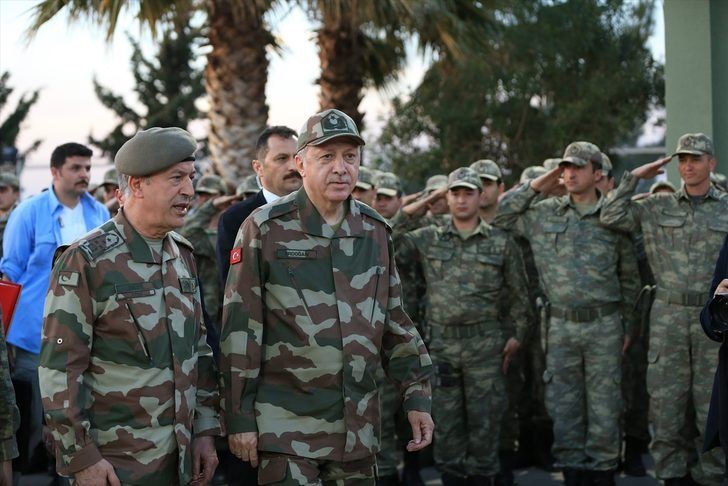Nordic Monitor
The Turkish military opposed President Recep Tayyip Erdoğan’s unilateral military intervention plans to create a safe zone in northern Syria in 2016, confidential military documents obtained by Nordic Monitor have confirmed.
The General Staff examined the possible consequences of a Turkish offensive in northern Syria and the safe zone to be created in the region and then reported on the results.
The analysis by General Staff personnel revealed how Turkey’s military brass resisted President Erdoğan’s pressure for unilateral military action in Syria while giving a green light to Turkey’s participation in a safe-zone initiative that would be carried out by the US-led Global Coalition to Defeat ISIS in the event a specific resolution was adopted by the United Nations.
Moreover, the military report underlined that Turkey should participate in international coalition activities by providing assistance in areas such as intelligence sharing, airspace access for coalition aircraft, training of peshmerga, humanitarian aid and consultation but refrain from deploying land forces in Syria.
According to the report, President Erdoğan’s government should remain neutral in clashes between the Islamic State in Iraq and Syria (ISIS) and Kurdish People’s Protection Units (YPG) in Syria.
Turkish commanders and military members were replaced by Islamists and neo-nationalists who were loyal supporters of Erdoğan’s policies, which triggered regional instability and crisis. It is no surprise that the first Turkish military incursion into Syria in 2017 took place in the aftermath of the coup attempt.
The Turkish military analysis, first, described the situation in Syria and argued that the necessary conditions to accomplish the mission envisioned by Erdogan to unilaterally establish a safe zone in Syria had not been met. In 2016, according to the document, ISIS conducted airstrikes and continued training and equipping local forces; the international community increased its pressure on Turkey to become more actively involved in coalition operations; and Western and regional countries signaled their their objection to an offensive in northern Syria.
The documents also underlined the fact that the UN did not adopt a resolution allowing a security zone in Syria, and UN Security Council Resolution 2178 (2014) does not provide a legal basis for foreign military intervention in Syria. In fact, Resolution 2178 called on states to respond to the evolving threat posed by foreign terrorist fighters (FTFs) recruited by ISIS, the al-Nusrah Front (ANF) and other cells, affiliates, splinter groups or derivatives of al-Qaeda.

The military analysis illustrated potential positive and negative consequences of a safe zone to be unilaterally established by Turkish forces in Syria. The Turkish safe zone could ensure the handling of new waves of Syrian refuges inside Syria and be seen as Turkey’s support for the international coalition in their fight against ISIS, the report stated.
According to the military analysis, launching a safe zone in northern Syria could trigger clashes between the Turkish military and ISIS, the YPG, Free Syrian Army or Syrian regime forces, cause ISIS attacks in the Turkish-controlled area and/or inside Turkey, lead to the breakdown of the peace process between Turkey and the outlawed Kurdistan Workers’ Party (PKK), give rise to PKK attacks especially in Turkey’s east and southeast and be considered an occupation of its territory by Syria, which could then declare war on Turkey.
Furthermore, the General Staff claimed that the situation following the setting up of the safe zone could force Turkey into a large-scale operation and that military expenses for establishing and securing the Turkish zone in Syria might bring huge economic costs to the country.
Turkish military operations in residential areas could lead to civilian causalities, and Turkey would be deemed responsible for those casualties; and the safe zone could be defined by the international community as an annexation of Syrian territory, upon which Turkey would then be accused of pursuing an expansionist policy based on its Neo-Ottoman approach, the military analysis stressed.
According to the documents, the consequences of a military offensive into Syria might result in a negative impact on Turkish-Russian relations and create new challenges to security in the Black Sea and Mediterranean regions.
The report supported the widely held view that the coup bid in July 2016 was a false flag organized by Erdoğan, his military and intelligence chiefs to push the reluctant Turkish army into an incursion into Syria. Using the coup attempt as a pretext, Erdoğan purged all generals and admirals who opposed a military adventure in Syria.












